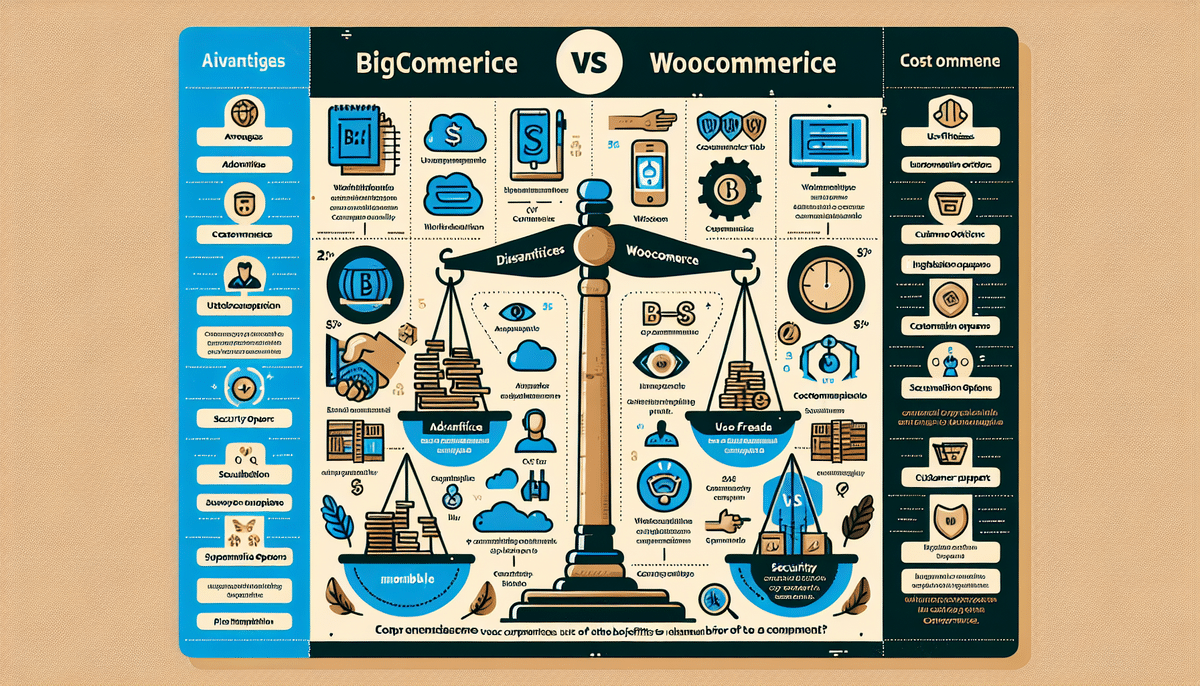BigCommerce vs Amazon: An In-Depth Comparison
Ecommerce has become an essential part of the global business landscape, with many small and large merchants taking their businesses online. With the increasing competition, choosing the right platform for your ecommerce store is more critical than ever. This article compares two of the most popular ecommerce platforms, BigCommerce and Amazon, to help you make an informed decision for your business.
What is BigCommerce?
BigCommerce is a cloud-based ecommerce platform that allows merchants to create and manage their online store and sell products and services over the internet. Founded in 2009, it has grown to become a preferred platform for many small and medium-sized businesses worldwide. BigCommerce offers a user-friendly interface that enables users to create an online store without any coding or design skills.
One of the key features of BigCommerce is its scalability. The platform can accommodate businesses of all sizes, from small startups to large enterprises. This means that as your business grows, you can easily upgrade your BigCommerce plan to meet your changing needs.
Another advantage of using BigCommerce is its extensive range of integrations and plugins. These integrations allow you to connect your online store with other business tools such as accounting software, email marketing platforms, and social media channels, helping to streamline your business operations and improve overall efficiency.
What is Amazon?
Amazon is the world's largest online retailer, boasting over 300 million active customer accounts worldwide. Amazon offers two main platforms for merchants to sell their products: Amazon Marketplace, which allows small and medium-sized businesses to sell their products alongside Amazon, and Amazon Webstore, which allows businesses to create their ecommerce store on Amazon's platform.
In addition to its ecommerce platform, Amazon has expanded into various other industries, including cloud computing, artificial intelligence, and entertainment. Amazon Web Services (AWS) is a cloud computing platform that provides a wide range of services, including storage, computing power, and database management. Amazon's AI assistant, Alexa, is integrated into various devices, including the Amazon Echo, and can perform tasks such as playing music, setting reminders, and controlling smart home devices. Amazon Prime Video is a streaming service that offers original content, as well as movies and TV shows from other studios.
Amazon has also faced criticism for its impact on small businesses and its treatment of workers. Some argue that Amazon's dominance in the ecommerce market has led to the closure of many small businesses, while others have raised concerns about the working conditions in Amazon's warehouses. Despite these criticisms, Amazon continues to be a major player in the ecommerce and technology industries, with a market capitalization of over $1 trillion as of 2023.
Pros and Cons of BigCommerce
Pros of BigCommerce
- User-friendly interface
- Wide range of features
- Active customer support
- High level of customization
- Scalability for businesses of all sizes
- Extensive integrations and plugins
- Robust security features
Cons of BigCommerce
- Can be expensive for small and medium-sized businesses
- Additional costs for advanced features and plugins
- Limited design options with restrictive templates
- SEO capabilities not as advanced as some other ecommerce solutions
Pros and Cons of Amazon
Pros of Amazon
- Large customer base
- Straightforward platform with pre-built templates
- Access to Amazon FBA (Fulfillment by Amazon) services
- Vast market reach with over 300 million active accounts
- Reliable infrastructure and customer trust
Cons of Amazon
- High seller fees ranging from 6% to 45% of the sale price
- Limited control over the design and branding of your store
- High level of competition among sellers
- Amazon's algorithm favors products with high sales and positive reviews
- Challenging for new or lesser-known sellers to gain visibility
Who Should Use BigCommerce?
BigCommerce is an ideal platform for small and medium-sized businesses looking for customization and control over their online store. It offers a range of features and advanced options that support businesses ready to scale. Additionally, BigCommerce supports a wide range of integrations with third-party apps, making it a more versatile platform than Amazon.
One of the key advantages of using BigCommerce is its user-friendly interface, which makes it easy for businesses to manage their online store without requiring extensive technical knowledge. This is particularly beneficial for small businesses that may not have a dedicated IT team to manage their online store.
Another advantage is its robust security features, which help protect businesses from online threats such as hacking and fraud. BigCommerce uses advanced security protocols to ensure that customer data is kept safe and secure, providing businesses with peace of mind when managing their online store.
Who Should Use Amazon?
Amazon is an ideal platform for merchants looking to tap into Amazon's massive customer base. Amazon Marketplace is a cost-effective way for small and medium-sized businesses to sell their products alongside Amazon, without the need to create their ecommerce store. Amazon is well suited to merchants with a high volume of sales and those seeking a one-stop-shop for their ecommerce needs.
In addition to its benefits for merchants, Amazon is also a popular choice for consumers. With its vast selection of products, competitive pricing, and fast shipping options, Amazon has become a go-to destination for online shopping. Amazon Prime, the company's subscription service, offers additional perks such as free two-day shipping, access to streaming services, and exclusive deals.
Furthermore, Amazon has expanded beyond just ecommerce. The company has ventured into industries such as cloud computing, artificial intelligence, and entertainment. Amazon Web Services (AWS) is a leading provider of cloud computing services, while Amazon Studios produces original movies and TV shows. This diversification has made Amazon a major player in various industries and has contributed to its overall success.
Features of BigCommerce
- Multiple payment gateway options
- SEO optimization
- Abandoned cart recovery
- Inventory management
- Range of templates and customization options
- Support for third-party apps and plugins
- User-friendly interface with drag-and-drop functionality
- Detailed analytics and reporting tools
- 24/7 dedicated customer support
Features of Amazon
- Large customer base
- Simple and easy-to-use platform
- Access to Amazon's FBA services
- Pre-built templates for store setup
- Support for payment processing, shipping, and order management
- Marketing tools including sponsored product ads, display ads, and video ads
- Analytics and reporting tools for sales tracking and listing optimization
- Robust customer review system
- Dedicated customer service team for buyer assistance
Pricing Comparison of BigCommerce and Amazon
BigCommerce offers several pricing plans, starting at $29.95 per month for its Standard Plan up to $299.95 per month for its Enterprise Plan. These plans provide access to a wide range of features and scalability options to support growing businesses. According to BigCommerce's Pricing Page, the company provides flexible plans tailored to different business needs.
Amazon charges a seller fee that ranges from 6% to 45% of the sale price, depending on the category of the product sold. While Amazon provides access to a vast customer base, the high fees can significantly impact profit margins, especially for lower-priced items. For detailed fee structures, refer to Amazon's Seller Fees.
Ease of Use Comparison Between BigCommerce and Amazon
BigCommerce offers a user-friendly interface with drag-and-drop functionality that allows users to create an online store without any coding or design skills. This ease of use makes it accessible for merchants who want to design and customize their storefronts efficiently.
Amazon provides an easy-to-use platform with pre-built templates that enable merchants to set up their ecommerce store quickly. The streamlined setup process is beneficial for sellers who want to start selling without the complexities of designing a website.
Customization Options Available on BigCommerce vs Amazon
BigCommerce offers a wide range of customization options, allowing merchants to create a store that aligns with their branding. Users can customize page layouts, colors, and fonts, add their branding elements, and create custom templates to ensure a unique and personalized shopping experience.
Amazon, on the other hand, offers limited customization options with pre-built templates to choose from. Merchants have less control over the design and branding of their store, which can make it challenging to differentiate from other sellers on the platform.
Which Platform Offers Better Customer Support - BigCommerce or Amazon?
BigCommerce offers active customer support, with a dedicated support team available to assist users 24/7. This comprehensive support ensures that merchants can resolve issues promptly and maintain smooth operations.
Amazon provides support for its FBA services, but merchants on Amazon Marketplace essentially have to be more self-reliant. While Amazon offers resources and guidelines, the level of personalized support is not as extensive as BigCommerce.
Which Platform is More Scalable - BigCommerce or Amazon?
BigCommerce is more scalable, with support for unlimited products, bandwidth, and traffic. This scalability makes it easier for businesses to grow without facing significant restrictions, allowing them to expand their operations seamlessly.
Amazon Marketplace places restrictions on the number of products a merchant can sell and limits bandwidth and traffic, making it harder to scale for larger businesses. These limitations can hinder growth and require merchants to seek alternative solutions as their business expands.
Integration Options with Third-Party Apps for BigCommerce vs Amazon
BigCommerce offers support for several third-party apps and plugins, including payment gateways, shipping providers, and marketing tools. This extensive integration capability allows merchants to enhance their store's functionality and tailor it to their specific business needs.
Amazon offers limited integration options, with only a few third-party apps and plugins available for use. This limitation can reduce the flexibility for merchants looking to implement specialized tools or enhance their store's capabilities.
Which Platform Offers Better Security - BigCommerce or Amazon?
Both BigCommerce and Amazon offer secure ecommerce platforms, featuring advanced security options such as SSL certificates and fraud detection features. These security measures help protect customer data and ensure safe transactions, providing peace of mind for both merchants and customers.
Comparison of Payment Gateway Options Available on Both Platforms
BigCommerce supports several payment gateway options, including PayPal, Stripe, and Square, with support for multiple currencies. This variety allows merchants to offer flexible payment options to their customers, enhancing the shopping experience.
Amazon offers a limited range of payment options, with restricted support for other currencies. This limitation can affect the purchasing experience for international customers and limit the payment flexibility for merchants.
User Reviews and Ratings for Both Platforms
BigCommerce has a rating of 4.7 out of 5 on G2.com, with 95% of users rating it 4 or 5 stars. Users praise its robust features, scalability, and excellent customer support.
Amazon has a rating of 4.4 out of 5 on TrustRadius, with 80% of users rating it 4 or 5 stars. Users appreciate the vast customer base and reliable infrastructure but note concerns about high fees and limited customization.
Conclusion: Which Platform is the Best Fit for Your Ecommerce Needs?
Choosing the right ecommerce platform can significantly impact your business's success. While both BigCommerce and Amazon offer unique benefits, BigCommerce provides more flexibility and control over your online store. Amazon, on the other hand, offers a vast market with considerable potential for businesses that can relinquish some control. Ultimately, it boils down to what’s essential to your business. The best way forward is to weigh the advantages and disadvantages of each platform against your specific business needs.




















